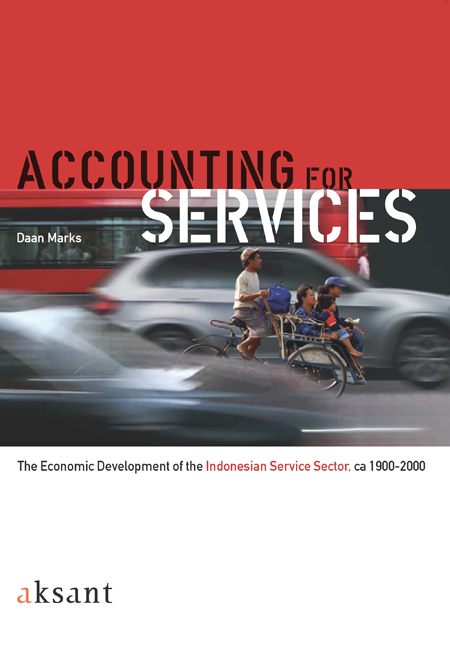Book contents
- Frontmatter
- Contents
- List of Tabels
- Acknowledgement
- 1 Introduction
- 2 National Accounting for Services in Indonesia
- 3 The Development of the Indonesian Service Sector: A Quantitative Analysis
- 4 Roads to Riches? Transportation and Economic Development in Indonesia
- 5 Involution and Growth: the Ambiguous Role of the Trade Sector in the Economic Development of Indonesia
- 6 Unity or Diversity?: Market Integration through Trade and Transport
- 7 Conclusions
- Appendices
- References
2 - National Accounting for Services in Indonesia
Published online by Cambridge University Press: 19 January 2021
- Frontmatter
- Contents
- List of Tabels
- Acknowledgement
- 1 Introduction
- 2 National Accounting for Services in Indonesia
- 3 The Development of the Indonesian Service Sector: A Quantitative Analysis
- 4 Roads to Riches? Transportation and Economic Development in Indonesia
- 5 Involution and Growth: the Ambiguous Role of the Trade Sector in the Economic Development of Indonesia
- 6 Unity or Diversity?: Market Integration through Trade and Transport
- 7 Conclusions
- Appendices
- References
Summary
INTRODUCTION
‘We need statistics not only for explaining things, but also in order to know precisely what there is to explain. […] It is impossible to understand statistical figures without understanding how they have been compiled. It is equally impossible to extract information from them or to understand the information that specialists extract for the rest of us without understanding the methods by which this is done – and the epistemological backgrounds of these methods. Thus, an adequate command of modern statistical methods is a necessary (but not sufficient) condition for preventing the modern economist from producing nonsense.’ (Schumpeter 1954: 14)
This chapter serves precisely the aim that economist and political scientist Joseph Schumpeter is supporting, namely a discussion of the estimation methods used to capture economic activity in the service sector within the system of national accounts. This is a necessary condition for the analysis in the subsequent chapters. This chapter starts with an overview of the history of Indonesian national income estimates, followed by an account of the data sources. After an extensive discussion of the estimation methods, some remarks will be made about the reliability of the estimates.
HISTORY OF INDONESIAN NATIONAL INCOME ESTIMATES
Before the Second World War a few tentative estimates of national income of Indonesia were published of which Louis Gotzen's (1933), then head of the Government Tax Accounting Service of the Netherlands-Indies, attempt was the most substantive. He found that the tax burden on Europeans and ‘Foreign Orientals’ (primarily Chinese) was higher than that on Indonesians, when he estimated total income for these population groups. Dutch economist Jacques Polak (1943), who had then just finished his PhD at Princeton University, was the first to prepare estimates resembling the present-day concept of national accounting. Combining the income and the production approaches, he produced estimates by industrial origin for the years 1921-1939 for indigenous Indonesians. To estimate total income for Europeans and ‘Foreign Orientals’ he used income tax data. Despite the fact that he had to make do with sources available in the United States, these estimates are regarded as having a considerable degree of reliability (Arndt and Ross 1970: 33).
- Type
- Chapter
- Information
- Accounting for ServicesThe Economic Development of the Indonesian Service Sector, ca 1900–2000, pp. 41 - 70Publisher: Amsterdam University PressPrint publication year: 2009



